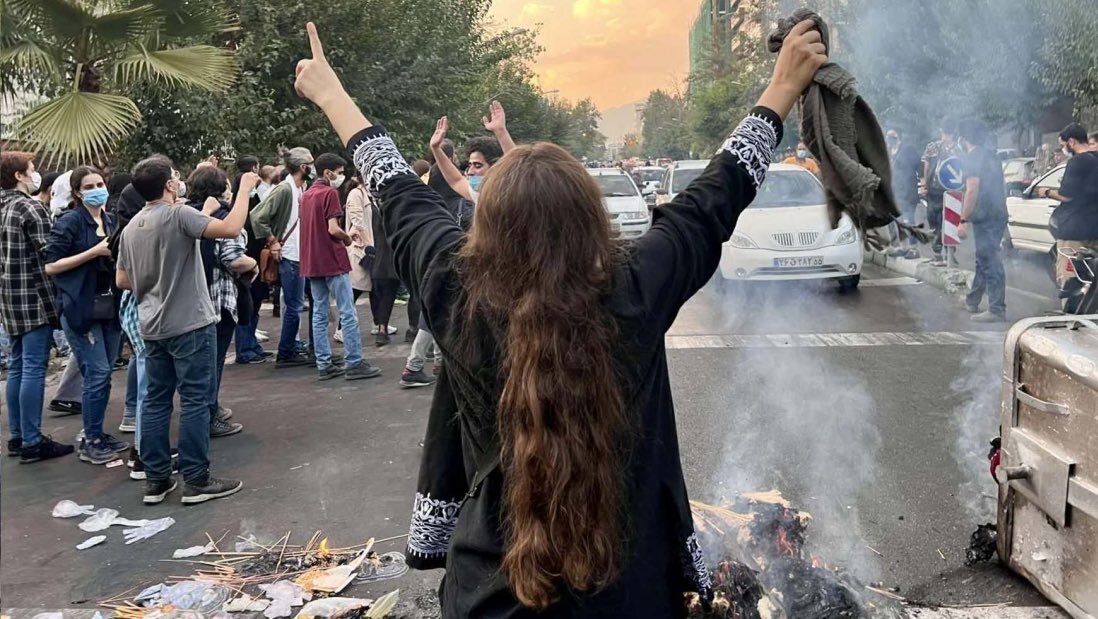The current protests in Iran were triggered by the death of 22-year-old Mahsa Amini, who was arrested by Morality Police officers outside a Metro Station in Teheran and died in custody on September 16. Her offence: not wearing her hijab the way in which she was expected to by the Morality Police. Under the condition that they remain anonymous, a legal expert from inside Iran explains the political dimensions of this special piece of cloth.
How did the obligation to wear a hijab become a law in Iran?
After two weeks of the Islamic Revolution in 1978, Ayatollah Khomeini, the first supreme leader, issued an extrajudicial order according to which all women were obliged to wear a hijab, especially in all workplaces. After the referendum which led to the announcement of the Islamic Republic in 1979, the state started to lay out this unwritten rule in the Criminal Code of Iran and criminalized revealing hijabs in Article 638 of the Islamic Criminal Code.
This Article provides that “women who appear in public without the Islamic hijab may be sentenced to ten days to two months in prison or fined fifty thousand (USD $1.50) or five hundred thousand rials (USD $15.00)” What is religious about the hijab?
Nothing. The hijab is a means to controlling women. The Islamic Republic says: If you are a woman and wear a hijab, you can benefit from your social and political rights and you can even progress in the hierarchy of power. But if you disobey and disrespect the symbol of the regime you will be put in jail.
The preamble of the constitution of the Islamic Republic states that “women shall not be considered as objects or workforce; the main duty of women is to be a mother”. What do you think about this attitude towards women?
It is discriminatory. We should not forget the patriarchal nature of the society of Iran at that time. This constitution was enacted more than 40 years ago. Women in Iran are subject to other discrimination by law. For instance, they inherit less than men, they do not have the right to divorce, they cannot travel without the permission of their husband or father. 40 years ago, these laws were written by men. But look at the current society in Iran, where women take to the streets and do not want to obey the oppressing law of hijab. And the more interesting point is that, along with women, men are also protesting this obligatory hijab and want gender equality. This shows an immense evolution in the values of society.
Since the start of the protests in August, at least 92 people have been killed according to the organisation “Iran Human Rights”. Why have people chosen the streets to claim their rights?
Since there is no democracy in Iran, people cannot change the law through their representatives in parliament. In order to present him/herself, every parliament member needs to get approval from the Guardian Council (Shuray-e Negahban) as an official candidate. This is a 12-member council; six of them are appointed directly by the supreme leader of Iran, Ali Khamenei, and the other six are appointed through the indirect influence of the supreme leader. In the political system of Iran, all politicians are appointed by the supreme leader either directly or indirectly and, consequentially, there is an accumulation of all the political power in one person, which ruins democracy.
Why does the judiciary of the Islamic Republic not react and punish this unlawful act of law enforcement?
This is because we do not have an independent judiciary and the head of the judiciary system is appointed through the direct order of the supreme leader, who must be a clergyman. And the head of the judiciary would never punish this kind of illegal act because he wants to continue the hegemony of the Islamic Republic. Imagine if the wrongdoer were punished by the judiciary: then no police officer would implement the unjust rules in the country.
From the beginning of the protests in Iran, the government has cut off the internet. What sort of support do you hope for from abroad in this situation?
“Naming and Shaming”. Iranian women need help from the world now to make their voices heard. The Islamic Republic prevents them from doing that by blocking social media, cutting off the internet and censorship. For instance, the current President of the Islamic Republic, Ebrahim Raisi, is a criminal....
You refer to his involvement in the execution of thousands of political prisoners in 1988, for which the special rapporteur for human rights of the United Nations accused Ebrahim Raisi of being responsible for a “crime against humanity”.
Yet we see at the same time that he was given a visa to attend the recent United Nations General Assembly while his government is attacking and killing hundreds of protesters on the streets of Iran. I think that targeted sanctions against politicians of the Islamic Republic would be a good option which democratic countries can choose, as Canada did many years ago. Canada put pressure on Iran after Zahra Kazemi, an Iranian-Canadian dual citizen, died in prison in 2003. This led to a series of diplomatic conflicts between the two governments and a complete severance of diplomatic relations in 2012.



